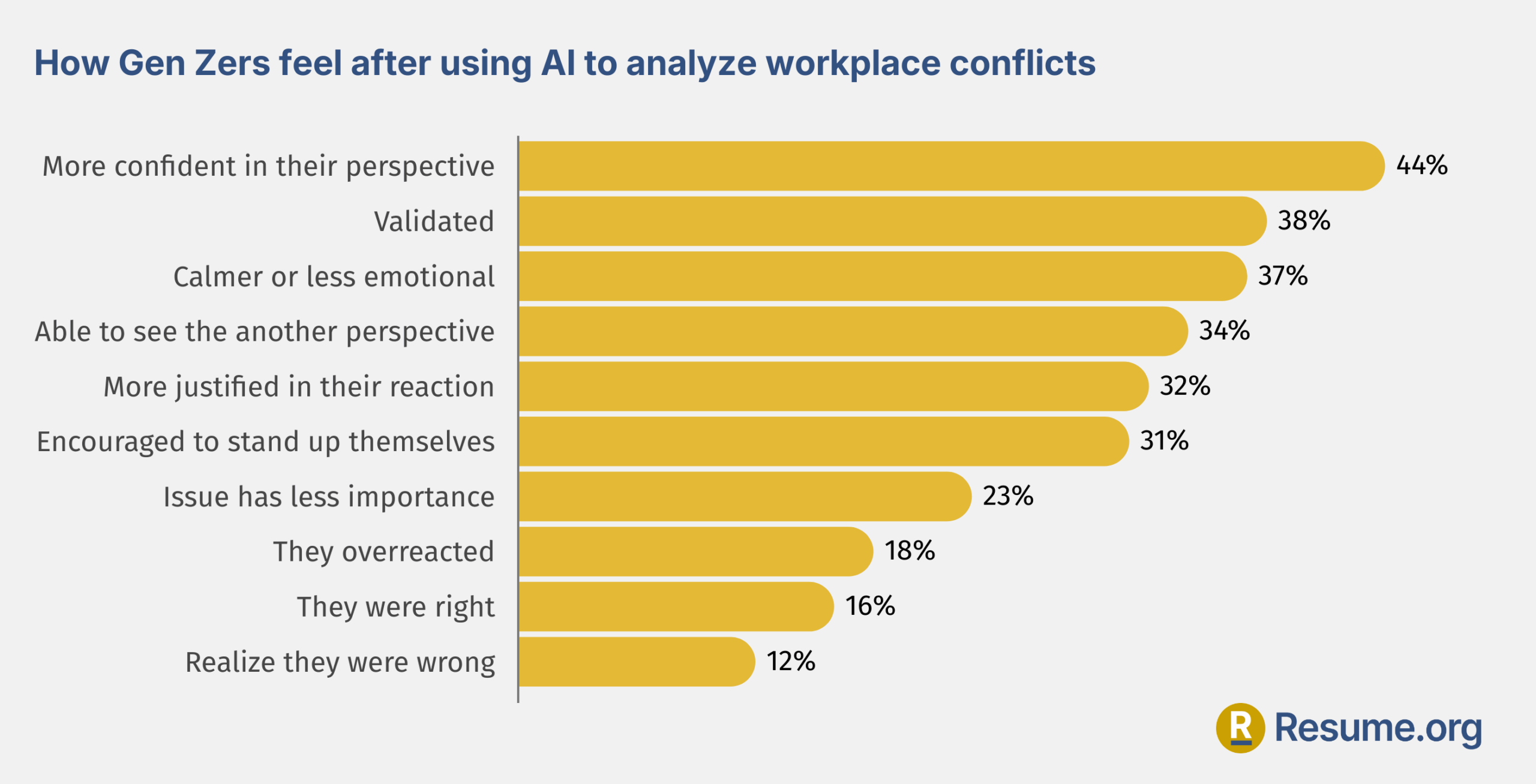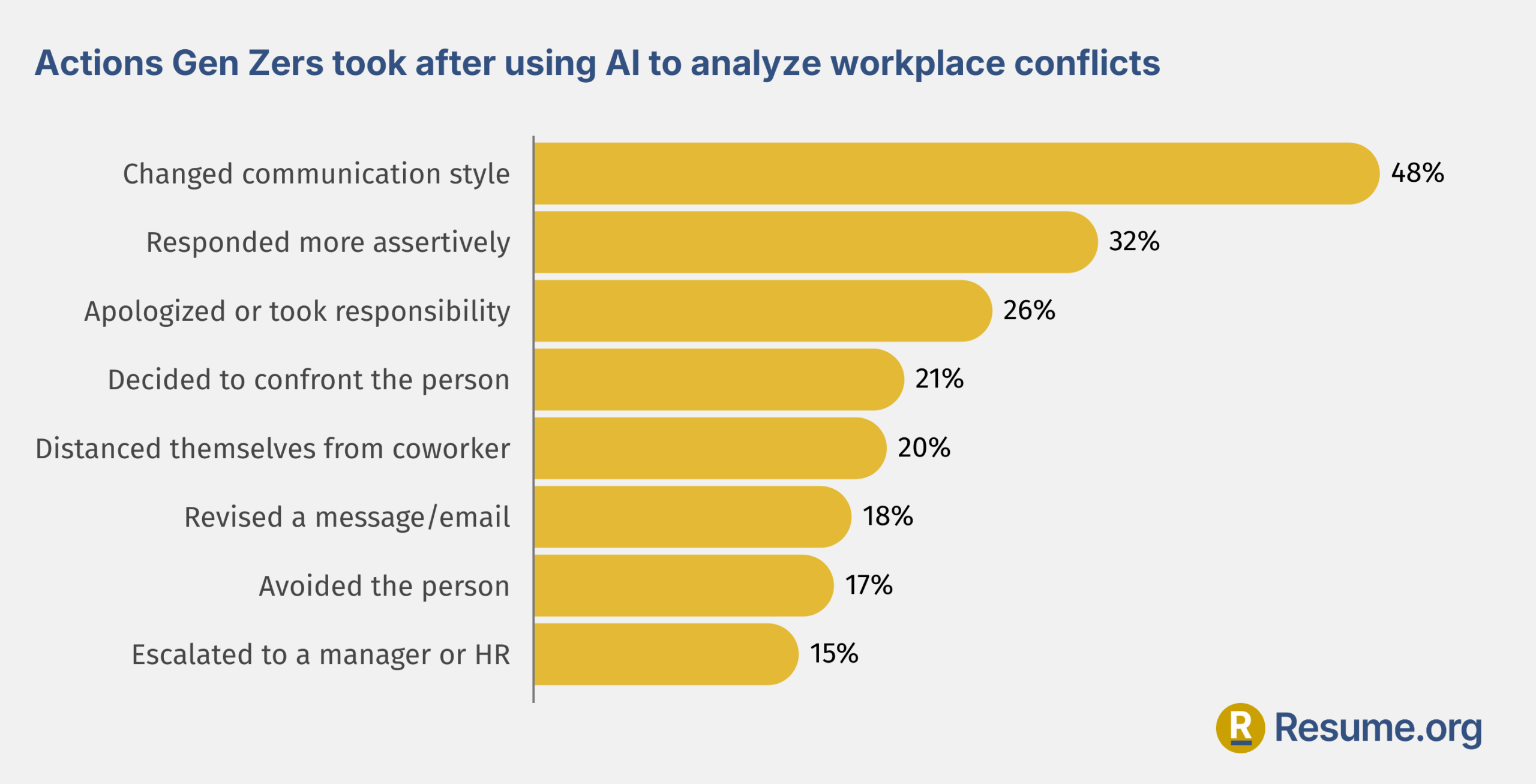According to a new survey from Resume.org of 1,022 full-time Gen Z workers, artificial intelligence (AI) has become a go-to resource for navigating everything from passive-aggressive emails to full-blown workplace conflicts. Whether it’s decoding a manager’s tone, drafting an appropriate reply, or confirming that, yes, that Slack message was out of line, young workers are increasingly turning to chatbots for real-time emotional triage.
The survey found that of Gen Zers who use AI chatbots:
- 94% use the tool to navigate workplace issues
- 43% feel more confident after discussing a situation with AI, and 38% feel validated
- Nearly half say AI changes how they communicate with coworkers
- 35% rarely or never disagree with how the AI interprets a situation
- 43% feel AI reinforces their beliefs, and 1 in 5 say it makes them less likely to take personal responsibility
AI Chatbots Help Gen Z Workers Decode Tone and Analyze Disagreements
AI chatbots are becoming unofficial mediators for Gen Zers. Based on this survey, 76% of full-time Gen Z workers use AI chatbots. Of this group, 94% have used the tool to navigate a workplace issue. For many, this isn’t just an occasional habit. In fact, 27% say they do this all the time, and 40% do so often.
Gen Z workers’ most common request is for help interpreting the tone of written messages: 75% say they’ve asked a chatbot to analyze the tone of an email, Slack message, or other digital communication. Just over half have used AI to better understand a conversation or interaction that made them feel bad, and a similar share have used it to interpret feedback from their manager. About 31% say they’ve used AI to analyze a disagreement with someone at work.
Scenarios Gen Z workers use AI
When asked to describe how they’ve used AI to navigate workplace issues, Gen Z workers shared a wide range of emotionally charged, often sensitive situations. Many of these scenarios involved miscommunication, unclear tone, or direct conflict with managers or coworkers.
Here are some of the responses Gen Z workers provided to our open-ended question:
- “My manager said some ageist comments to me. I used AI to see if the comments were actually ageist or if I was overthinking it.”
- “When my coworkers were clashing and I asked what I could do.”
- “One of my coworkers stated that I wasn’t doing my job correctly, but I was doing my duty as a worker. I talked to her about it, and what she thought I could improve on. She gave me some feedback, so I shared it with GPT and got some solutions.”
- “I asked ChatGPT to read an email from my passive-aggressive boss and compile a list of all phrases, words, and figurative language that could be considered a microaggression.”
- “I asked it what the best way to diffuse this particular scenario of conflict in the workplace was.”
- “There was a disagreement on who should take leadership on a particular project, and I used AI to read the conversation and give advice on how to respond.”
- “My boss told me I was wrong, and I didn’t think I was. I asked AI how it would interpret the situation.”
- “One of my coworkers stole one of my clients who she visibly saw was labeled as mine. I was very upset and needed some advice on how to handle the conversation properly and professionally.”
AI Helps Gen Z Workers Feel Validated and Communicate Differently
For many Gen Z workers, talking through a workplace conflict with AI leads to a shift in how they feel and act. After using a chatbot to process a situation, 43% say they feel more confident in their perspective. About 38% feel validated, and 37% feel calmer or less emotional. Around 34% say the tool helps them understand the other person’s point of view, while 32% feel more justified in their reaction. Another 31% say it encourages them to stand up for themselves.
“Gen Z workers often feel more validated and confident after consulting AI because these tools offer immediate, judgment-free feedback in a format that feels safe and familiar to this generation raised in the digital world,” says Kara Dennison, head of career advising at Resume.org.
Some admit AI gives them reason to reflect. A total of 18% say they realize they may have overreacted, and 12% come to believe they were wrong.

These mindset shifts often lead to behavior changes. Nearly half of Gen Z workers (48%) say they change how they communicate with other people after using AI. About 32% respond more assertively than usual, and 26% end up apologizing or taking responsibility. Roughly 21% choose to confront the person directly, while 20% distance themselves instead. Another 18% revise or decide not to send a message they had already written. A total of 17% say they avoid the person entirely, and 15% escalate the situation to a manager or HR.

Dennison explains that AI chatbots act like neutral digital coaches, helping users process emotions and rethink their responses without needing to talk to another person. However, AI isn’t always neutral and can amplify emotional reactions if it’s only hearing part of the story.
1 in 5 Gen Zers Say AI Chatbots Have Made Them Less Likely To Take Personal Responsibility
While many Gen Z workers say AI helps them process workplace conflict in a helpful way, not all outcomes are positive.
Among Gen Z workers who use AI chatbots to navigate workplace issues, 35% say they rarely (29%) or never (6%) disagree with how the chatbot interprets a situation. Additionally, 17% say using AI in this way has made them less likely to take personal responsibility, and 43% say the chatbot reinforced their own biased reaction or beliefs.
Dennison cautions that relying too heavily on AI to resolve workplace conflict can lead to blind spots. When users turn to chatbots to confirm their own perspective rather than seek an objective view, they risk reinforcing bias instead of challenging it.
“One of the biggest risks is the elimination of personal responsibility,” she explains. “If an AI tool consistently validates a user’s perspective without challenging it, it can reinforce a fixed mindset, enabling blame-shifting rather than self-reflection.”
She also emphasizes that chatbots aren’t equipped to handle the nuance required in sensitive workplace dynamics. Unlike human mentors or managers, AI can’t interpret body language, understand power imbalances, or navigate organizational context. As Dennison puts it, “AI chatbots can’t read body language, understand organizational dynamics, or weigh power imbalances the way a trained leader or coach can.”
Over time, this can impact professional development. If Gen Z workers begin treating AI as an emotional authority rather than a tool, they may miss out on the growth that comes from real-world feedback. As Dennison says, “Healthy workplace communication depends on empathy, active listening, and accountability. AI can complement that process, but it cannot replace it.”
Methodology: Resume.org commissioned this survey, which was conducted via Pollfish in June 2025. A total of 1,022 full-time U.S. Gen Z workers participated in the survey.
To view all of our other research and studies go to our research page.
Resume.org offers free, HR approved resume templates to help you create a professional resume in minutes. Choose from several template options and even pre-populate a resume from your profile.